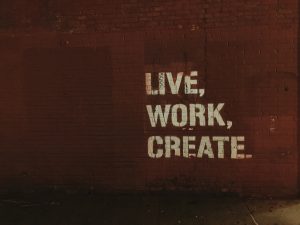 It is unlikely that I will change my toon any time soon – simple answers to complex problems don’t result in long term solutions.
It is unlikely that I will change my toon any time soon – simple answers to complex problems don’t result in long term solutions.
I know many are frustrated that their current jobs are fading away. At the same time, how is there so much buzz about an abundance of jobs not being filled? Either we have a shortage of jobs or we have a shortage of workers – but we can’t have both. And the truth is…we have a job mismatch.
As the world evolves, so does the marketplace. Accordingly, job needs change too. This is a completely predictable cycle. So why is it being highlighted more now than it likely was decades ago? The short answer is that due to changes in technology, the world is evolving at a much faster rate than in the past. The next fact is that people are living longer and therefore working longer. Translated, where jobs of the past existed for an entire lifetime of a worker, now, jobs cycle out before they retire.
Continuous learning and change are an unavoidable requirement to maintain employment into the future.
Yet, generations of people have not had to face this change expectation. Frankly, I’m not sure many even realized it was coming unless they were living in metropolitan cities and keeping abreast of all the movement happening within businesses of all types. Yes, there are people in this world that follow every news story and every innovation – but those people do not make up the majority of us. Most of us just want to get through the day, take care of our kids, and maintain our homes. It seems like it should be simple – just bring back jobs that have been lost.![]()
But simply re-adding old jobs will work only for a short period of time…just until the world shifts to an unrecognizably fast-paced, ever changing, blur of constant expectation, data consumption, and information overload.
It’s no wonder at all that people are feeling overwhelmed and wish for their previous or current jobs to be reinstated or maintained. Unfortunately, simple solutions such as bringing back jobs in areas that will become obsolete, is only delaying the inevitable.
We need to educate our people of all ages for jobs of the future. It’s not about simply creating a means for Americans to take care of their families, it’s about national economic success and leadership.
Regardless of political party, education to elevate our people’s opportunities is an investment that makes sense at the human and fiscal levels.
Photo by Clem Onojeghuo on Unsplash Photo by Saulo Mohana on Unsplash Photo by Alex Kotliarskyi on Unsplash Photo by rawpixel on Unsplash Photo by Sharon McCutcheon on Unsplash

 The start of the women’s movement was a necessary joint action by those who came before me. It seems so long ago but truly, even yesterday, an older woman explained to me that people do not listen to women’s words but only judge them by their exteriors. Is she right? Perhaps. Have I seen it in my professional life? No – or at least not to that extent. Am I missing something? Possibly. But at the end of the day, does it matter?
The start of the women’s movement was a necessary joint action by those who came before me. It seems so long ago but truly, even yesterday, an older woman explained to me that people do not listen to women’s words but only judge them by their exteriors. Is she right? Perhaps. Have I seen it in my professional life? No – or at least not to that extent. Am I missing something? Possibly. But at the end of the day, does it matter?



 Women are on the move. We are on a path to declare who we really are. We are pressing forward with not only a personal set of goals but with a sense of joint purpose.
Women are on the move. We are on a path to declare who we really are. We are pressing forward with not only a personal set of goals but with a sense of joint purpose.
 I read a recent ethics editorial that featured a college professor who was expressing frustration over how the college at which he or she worked was, out of financial necessity, admitting students at higher rates. The professor said this has led to a large number of entrants who a) don’t have the skills that make them ready to learn and perform at this higher level, b) are working and having families when studying, leaving them very little time to commit to their studies, and c) are there to acquire a skill/proof of knowledge rather than to learn to think and expand their minds. Given the lack of what we might term, ‘learner readiness’, the professor has witnessed high failure rates for individual classes and eventually from the entire college experience…which leads to high rates of college debt. This is a great example of how a well-intentioned plan (encourage more people to attend college in order to get better jobs) has created a ripple effect that while helped some, also hurt others.
I read a recent ethics editorial that featured a college professor who was expressing frustration over how the college at which he or she worked was, out of financial necessity, admitting students at higher rates. The professor said this has led to a large number of entrants who a) don’t have the skills that make them ready to learn and perform at this higher level, b) are working and having families when studying, leaving them very little time to commit to their studies, and c) are there to acquire a skill/proof of knowledge rather than to learn to think and expand their minds. Given the lack of what we might term, ‘learner readiness’, the professor has witnessed high failure rates for individual classes and eventually from the entire college experience…which leads to high rates of college debt. This is a great example of how a well-intentioned plan (encourage more people to attend college in order to get better jobs) has created a ripple effect that while helped some, also hurt others. 


 When we oversimplify, we miss important underlying problems that will resurface again and again and again. When
When we oversimplify, we miss important underlying problems that will resurface again and again and again. When 
 I have spent years searching for a universal truth across cultures and nations – something that could bind us all together, to help understand one another. The one that surfaced and remained in the forefront is the drive to protect our babies, our offspring. The intense, biologically-based bond to our children is one that transcends time, space, and culture. The deep feeling of utter devastation and fear that one feels when they realize they can’t protect their children from harm is not only intense, but I believe universal.
I have spent years searching for a universal truth across cultures and nations – something that could bind us all together, to help understand one another. The one that surfaced and remained in the forefront is the drive to protect our babies, our offspring. The intense, biologically-based bond to our children is one that transcends time, space, and culture. The deep feeling of utter devastation and fear that one feels when they realize they can’t protect their children from harm is not only intense, but I believe universal.


 We don’t have a job shortage, we have a job-mismatch problem.
We don’t have a job shortage, we have a job-mismatch problem.
 All roads lead to the need to include arts education as a significant part of learning for the future.
All roads lead to the need to include arts education as a significant part of learning for the future.



